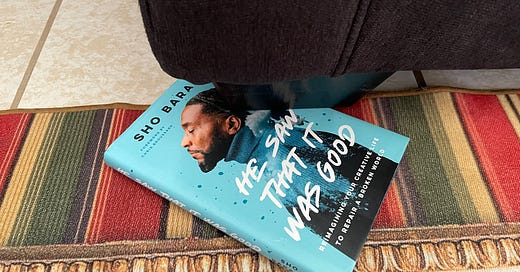Creativity is an unruly beast. This ongoing series aims to make sense of (and harness) our imagination. Creatives and non-creatives alike are often at a loss trying to define or capture it. In this first article, we’ll focus on the spiritual side of creativity while using rapper and activist Sho Baraka’s book He Saw That It Was Good as our pop culture guide. We’ll look at creativity’s foundations by defining it, seeing where it comes from, then seeing how it defines us.
Creativity and Spirituality: A Firm Foundation
We’ve probably heard creativity defined as something like “to cause to exist.” But I look at creativity as problem-solving…and thinking outside the box, but mostly problem-solving. An artist solves the problem of a blank canvas or lump of clay by transforming it into a beautiful masterpiece. Throughout the Bible God explains how He gives people inspiration to create. For example, several times in Exodus God says He gifted artisans to build the Tabernacle and Ark of the Covenant. So there is a spiritual side to creativity.
This is true whether we believe in God or not. True whether we try and keep our personal life and religious life separate. And truth is a theme of Baraka’s book. “To be a good storyteller,” he says, “you must first be an honest observer. No matter what you’re cooking, honesty is the best ingredient.” This may seem like a no-brainer. But there are many forces at work, ourselves included, purposefully or accidentally attempting to edit or hinder complete truth in our imaginations.
If we really want to be truthful about defining and understanding creativity’s foundations, we have to be willing to accept wherever it takes us. Many of us who have some recognizable artistic skill can look down on others who don’t. But defining creativity as problem-solving is quite broad and implies anyone can be creative. In fact, everyone has God-given creative attributes, and they are highlighted in the opening words of the Bible.
Genesis 1:26 says, “God said, ‘Let Us make man in Our image, according to Our likeness.’” Much has been postulated about what “image” and “likeness” mean here. But for our purposes the word that stands out is “make.” We were made and have the ability to make. God is not a creator, He is the Creator, and He has given His children the amazing ability to sub-create. John 1 mirrors the testimony we just read from Genesis. The Gospel of John begins by elaborating that it was God in the Person of Jesus who created us. This shows that although unmatched in creative power, our humble Servant-Savior came in the essence of His creation.
So often we have frustrations and restlessness in life because we’re not actively recognizing Jesus as our creator and not managing the responsibility of our creativity. I think of the animated film 9, which shows how a creating creation can spend its life searching for its creator. If we know Jesus and can accept that all of our creative ability is because we were made in His image, we have an opportunity to find inspiration and rest.
Identity in Creativity
If we’re honest, how often do we feel inspiration and rest in our identity? In our creativity? Baraka says, “We must constantly remind ourselves that we can go from Eden’s honest orphans to thieves who desire to steal the show.” Being honest about our constant desire to be in the spotlight and to unknowingly subvert God’s plan to construct is only part of creativity’s truth telling. In fact, we can agree to define creativity as problem-solving and that it starts with God making us sub-creators but still misidentify our identity.
Baraka again eloquently informs:
Our creative life isn’t just about what we do. It’s about who we are. I believe the gospel isn’t just a redemption of our activity; it is ultimately a redemption of our identity. If we never tell our deepest story honestly, then we can never truly reform.
I’ve seen this in my creativity where I restrict truth because my audience may be offended or I edit content due to pressure from an editor, friend, or even detractor. Being compassionately raw and honest may be difficult and can’t be forced but the truth wants to get out.
To be in touch with the identity Jesus created uniquely for us and knowing it will not break from the guardrails of the Bible is simultaneously disconcerting and comforting. We may feel like The Little Mermaid, creative (singing, exploring human forks) but unsure of our identity (belonging in another world, tired of our fish tail). Harkening back to Baraka’s wise words, if our identity isn’t true, our creativity will be false, and we’ll never achieve reformation in ourselves or others. We’ll attempt the satisfaction of problem-solving and bettering the world, but consistently fall short.
May You Have a Strong Foundation When the Winds of Creativity Shift
When we humbly acknowledge our creative foundation comes from being made in God’s image, we can find a new mindset. Defining creativity as problem-solving focuses us. But recognizing our identity in Jesus as who we were made to be and resolving to be honest in our problem-solving allows us to truly be creative. Because this may be a lot to process, I’m waiting until part 2 of this series to give practical applications on creativity. For now, enjoy exploring creatively who you were made to be.




